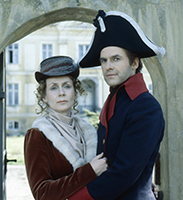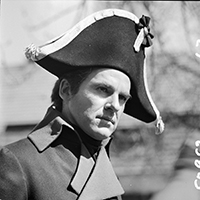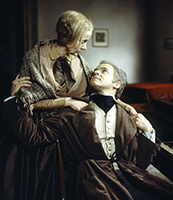
THE CLAUSEWITZ STUDIES NEWSLETTER
Issue: No.1 - No.2 - No.3 - No.4 - No.5 - No.6
No.7 - No.8 - No.9 - No.10 - No.11 - No.12
Welcome to all subscribers of The Clausewitz Studies Newsletter! We hope you will enjoy this issue, which focuses on articles and news concerning the great Prussian's legacy.
In September 1806 Carl von Clausewitz, a 26-year-old lieutenant and aide-de-camp to Prince August, was part of the Prussian army slowly moving on its way to meet Napoleon. After 1795 Prussia had given up on fighting Revolutionary France and observed from afar the Corsican’s rise. Finally Napoleon was coming for Prussia. Neighboring Saxony, now a Prussian ally, was about to become the arena of this epic clash.
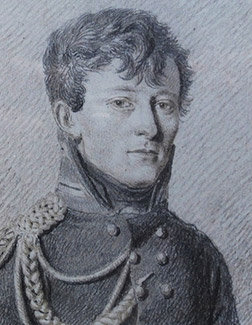 On
its way south, the Prussian army crossed some of the battlefields of its most
famous king, Frederick the Great, who had fought and won great victories in the
Seven Years’
War. Conflicted and uncertain, Carl toured Roßbach and wrote back to Marie that
he wished the daring spirit of the Old Fritz—always “a desperate gambler” in
the face of numerically superior enemy forces—could once again grip Prussia’s
commanders. At other times the young officer brashly scribbled that, no matter
how small the possibility was, he still believed in a miraculous victory over
Napoleon—perhaps because an improbable triumph would bring Carl military glory
and a chance to marry Marie soon. Or, in the face of French prowess and
Prussian weakness, he simply needed some reassurance, a leap of faith, that
defeat was not so certain and that he might survive the bloodshed.
On
its way south, the Prussian army crossed some of the battlefields of its most
famous king, Frederick the Great, who had fought and won great victories in the
Seven Years’
War. Conflicted and uncertain, Carl toured Roßbach and wrote back to Marie that
he wished the daring spirit of the Old Fritz—always “a desperate gambler” in
the face of numerically superior enemy forces—could once again grip Prussia’s
commanders. At other times the young officer brashly scribbled that, no matter
how small the possibility was, he still believed in a miraculous victory over
Napoleon—perhaps because an improbable triumph would bring Carl military glory
and a chance to marry Marie soon. Or, in the face of French prowess and
Prussian weakness, he simply needed some reassurance, a leap of faith, that
defeat was not so certain and that he might survive the bloodshed.
Soon enough Carl’s worst fears came true. The catastrophe at Jena-Auerstedt would forever mark his life and work. In his essay “Jomini” in Makers of Modern Strategy, John Shy writes that Clausewitz’s first-hand traumatic experience of defeat and humiliation was the prevailing physiological trait separating him from his great rival. Jomini, the other famous Napoleonic era military theorist, never knew such anguish and his world was that of heroic, masterful commanders. Clausewitz, in Shy’s words, “approached war as a complex totality, seeing it in what might be called tragic terms, always threatening to escape human control.”
CONTENTS
In this sixth issue of The Clausewitz Studies Newsletter:
• What we found interesting: Articles, News, and Podcasts
• Old but Good: From the copious bibliographies of ClausewitzStudies.org
What we found interesting
If you have encountered
Carl von Clausewitz’s name in the news recently, it is for sure in connection
with Rosa Brooks’s new book How
Everything Became War and the Military Became Everything. Here is one of
Brooks’s interviews, in The Atlantic, where she discusses
Clausewitz’s concept of war and why she thinks we might need a new one. (Link) This is a long,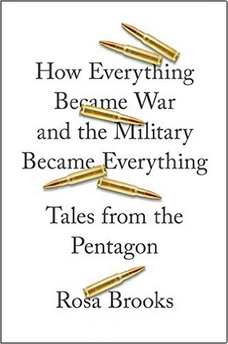 interesting and thought-provoking discussion for our times, even if we don’t
quite agree with Brooks’s main argument that modern categories of war and peace
have to be developed instead of shoring up the original ones. “Maybe we now
live in a world in which we need an in-between category, something that’s in
between war and peace, with a set of in-between implications for law and for
power and for rights,” she says in The Atlantic interview.
interesting and thought-provoking discussion for our times, even if we don’t
quite agree with Brooks’s main argument that modern categories of war and peace
have to be developed instead of shoring up the original ones. “Maybe we now
live in a world in which we need an in-between category, something that’s in
between war and peace, with a set of in-between implications for law and for
power and for rights,” she says in The Atlantic interview.
All this might sound vaguely familiar. Two years ago Brooks, a Georgetown professor, former Pentagon adviser and Foreign Policy columnist, ignited a firestorm among military experts and Clausewitzians with similar statements. As a result, a few compelling texts on the subject were written and widely discussed. See Tom Ricks’s ardent initial post, “Future of War: Rosa Brooks Smacks Down 19th c. Industrial Era Theories about Warfare.” (Link) Chris Mewett’s thoughtful answer “Understanding War’s Enduring Nature Along With Its Changing Character.” (Link) Rosa Brooks’s rebuttal was “Fighting Words: Has the Nature of ‘War’ Changed since the Days of Clausewitz?” (Link). And finally Leonidas Musashi (any idea who’s hiding behind this pseudonym?) published “Much Ado About Nothing: Future of War v. Clausewitz… But Not Really.” (Link)
Perhaps now we will see another round of popular essays and scholarly works on the subject. We can’t wait!
If you have more time on your hands, we suggest reading a slightly older lecture by David Kennedy: “War and International Law: Distinguishing Military and Humanitarian Professions.” (Link) Kennedy reasons that, in reality, the concept of war and peace that Clausewitz held in the early 19th century was different from that of the American Civil War. The concept before WWI diverged even more from the concept that emerged after WWII.
It is often said that without Gerhard von Scharnhorst, there wouldn’t have been a Carl von Clausewitz—not least because without Scharnhorst’s attention and nurturing, Clausewitz, an autodidact who had left school at age eleven, would have failed the Military Institute for Young Officers in the first year. Anthony Lias, an Australian officer with a passion for PME, offers a short but illuminating blog post on the great military educator’s legacy. (Link; don’t miss the debate in the comments section.) Bonus: The article provides links to additional texts of interests, among them “Lessons from the Kriegsakademie: A Reflection of the Present? A Road Map for the Future?”
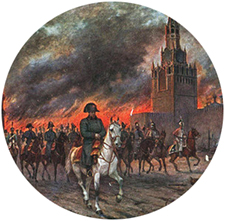 In The Strategy Bridge, Olivia Garard examines the difference between Clausewitz and Thomas C. Schelling’s
concept of the threat. “With the detonation of the atomic bomb and the
proliferation of nuclear weapons, many find Clausewitz wanting. How can there
be a decisive battle without nuclear annihilation? … Enter Thomas C. Schelling
and his work on The Strategy of Conflict—an attempt to comprehend and
harness force within the context of nuclear weapons,” Garard writes. Yet, as
she points out, “the transformations in war that [the two theorists] bore
witness to—Napoleon and nukes—were similarly jarring…. Both turn to the concept
of the threat to compensate for the failure of war in reality to realize its
theoretical potential. Ultimately the difference between Clausewitz and
Schelling lies in the utility of threat.” See "The Threatening Space Between Napoleon and Nukes: Clausewitz vs. Schelling."
In The Strategy Bridge, Olivia Garard examines the difference between Clausewitz and Thomas C. Schelling’s
concept of the threat. “With the detonation of the atomic bomb and the
proliferation of nuclear weapons, many find Clausewitz wanting. How can there
be a decisive battle without nuclear annihilation? … Enter Thomas C. Schelling
and his work on The Strategy of Conflict—an attempt to comprehend and
harness force within the context of nuclear weapons,” Garard writes. Yet, as
she points out, “the transformations in war that [the two theorists] bore
witness to—Napoleon and nukes—were similarly jarring…. Both turn to the concept
of the threat to compensate for the failure of war in reality to realize its
theoretical potential. Ultimately the difference between Clausewitz and
Schelling lies in the utility of threat.” See "The Threatening Space Between Napoleon and Nukes: Clausewitz vs. Schelling."
Some years ago a group of enthusiasts met online, read On War’s every chapter and debated it together, without relying on secondary sources. (Link) “Everyone found something in Clausewitz that was new. It was blogging at its best, an online experience that now seems lost and forgotten in a rapid-fire era of 144-character tweets, Facebook memes, and cat videos,” said the organizers of "The Clausewitz Roundtable" in describing their intellectual adventure. Finally, the book containing all of their musings and arduous debates is out. (Link to Amazon)
Old but Good
Since we are on subject of war’s nature, changing character, and new ways of being fought, here is a list of some relevant texts you can read on ClausewitzStudies.org’s English bibliography.
Mark Clodfelter, "Back From the Future: The Impact of Change on Airpower in the Decades Ahead." (Link) This article contains a useful discussion of the distinctions between "nature," "character," and "conduct" of war in Clausewitz's On War.
Sebastian Kaempf, "Lost through Non-Translation: Bringing Clausewitz's Writings on ‘New Wars’ Back In.” (Link, Subscription). Kaempf analyses Clausewitz's earlier and mostly untranslated writings and uncovers a critical part of Clausewitz's expertise in asymmetric warfare.
Meanwhile Clausewitz’s lectures on Small Wars have been translated into English. (Link) In 2005 one of its translators, Christopher Daase, also extensively discussed the great Prussian’s understanding of asymmetrical warfare. (Link) Daase argues that Small Wars and other lesser-known texts “provide the means for a superior conceptualization of political violence that allows describing historical and recent changes of war, including the emergence of guerrilla warfare and terrorism.”
Panorama
Clausewitz, The Movie (original tittle “Clausewitz—Lebensbild eines preußischen Generals”) is now available for pre-order on Amazon, the official release date is 28 October. (Link) Hat tip: to Birgit Heitfeld-Rydzik from Müenster University and State Library. As of yet, there is no information about English subtitles, so perhaps it is high time to brush up your German. Click on the thumbnails below to see larger pics from the movie.
We heartily enjoyed Matt Cavanaugh’s Sixteen Lessons About War From A Three Year Old (Link). Favorite lesson: “Clausewitz did his best to define “friction” in war as the “force that makes the apparently easy so difficult.” However, if I had to teach this concept to a student, I wouldn’t assign Clausewitz’s book, On War. I’d tell him to take my kid to Target to buy some dental floss, crayons, and a pair of pink socks…. By the time he gets home—if he gets home—he’ll have a PhD in “friction.” Chapeau, Matt Cavanaugh!
Last month’s segment about Clausewitz’s family background and especially his family brewery business created a true Twitter beer brawl. Perhaps because it was one of those slow days at the office, perhaps because it was Friday and International Beer Day…. Here are some of the funniest and snarliest tweets.
VanyaEftBellinger @vanyaef Aug 5
Just in time for #InternationalBeerDay "Clausewitz Home Brew, Since 1738" in the new #Clausewitz StudiesNewsletter
Little disappointed. I thought there was an actual CvC home brew. Maybe he started making one but never finished it….
VanyaEftBellinger @vanyaef Aug 5
And Marie wasn't interested in completing this task
Because people would have spent their entire lives arguing whether he was trying to make an IPA or a porter.
But there will always be a small faction that stands by the belief that Jomini's home brew recipes are better.
"... by other meads.
VanyaEftBellinger @vanyaef Aug 5
And others dispute whether 19th century home brew tastes anything like 21st century beer.... We can do this all day :)
Others still may remind you Gustavus Adolphus home brewed before any of the others. The nature of home brew is eternal.
(Some passionate home brewers actually promised to study the issue of Clausewitz’s family recipe, in all earnestness.)
Brody Burks @brodyvburks Aug 5
I blame @vanyaef for a rabbit hole, but I bet Clausewitz would have brewed a Gose or Maibock. Lactobacillus would have figured in.
Cheers!
P.S. If you have an interesting article in mind, please send us a link, plus a short description if it is written in a language other than English, German, Russian, or Bulgarian. (Vanya's French works only for 1-2 page article.)
Bulletin Board
We still are looking for volunteers! We would like to gather a team of scholars well versed in both English and German who would like to collaborate on new translations of Clausewitz’s works. Please let us know if you are interested and can volunteer your time and skills. Contact Vanya E. Bellinger or ClausewitzStudies.org.
Come join our merry team! And please send us anything else you find relevant, interesting, and newsworthy to include in our next issue.
Until October, Happy Reading!
|
With warmest regards, |

